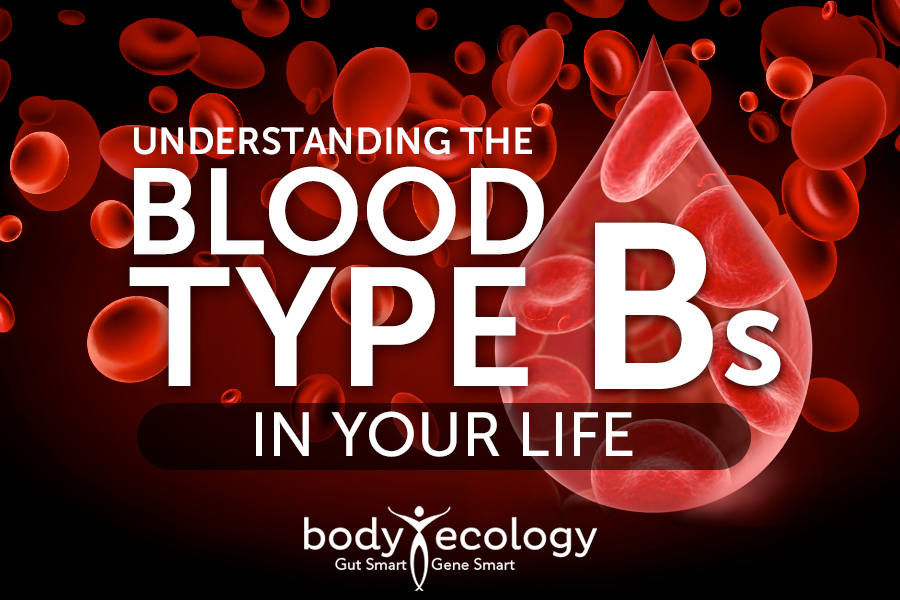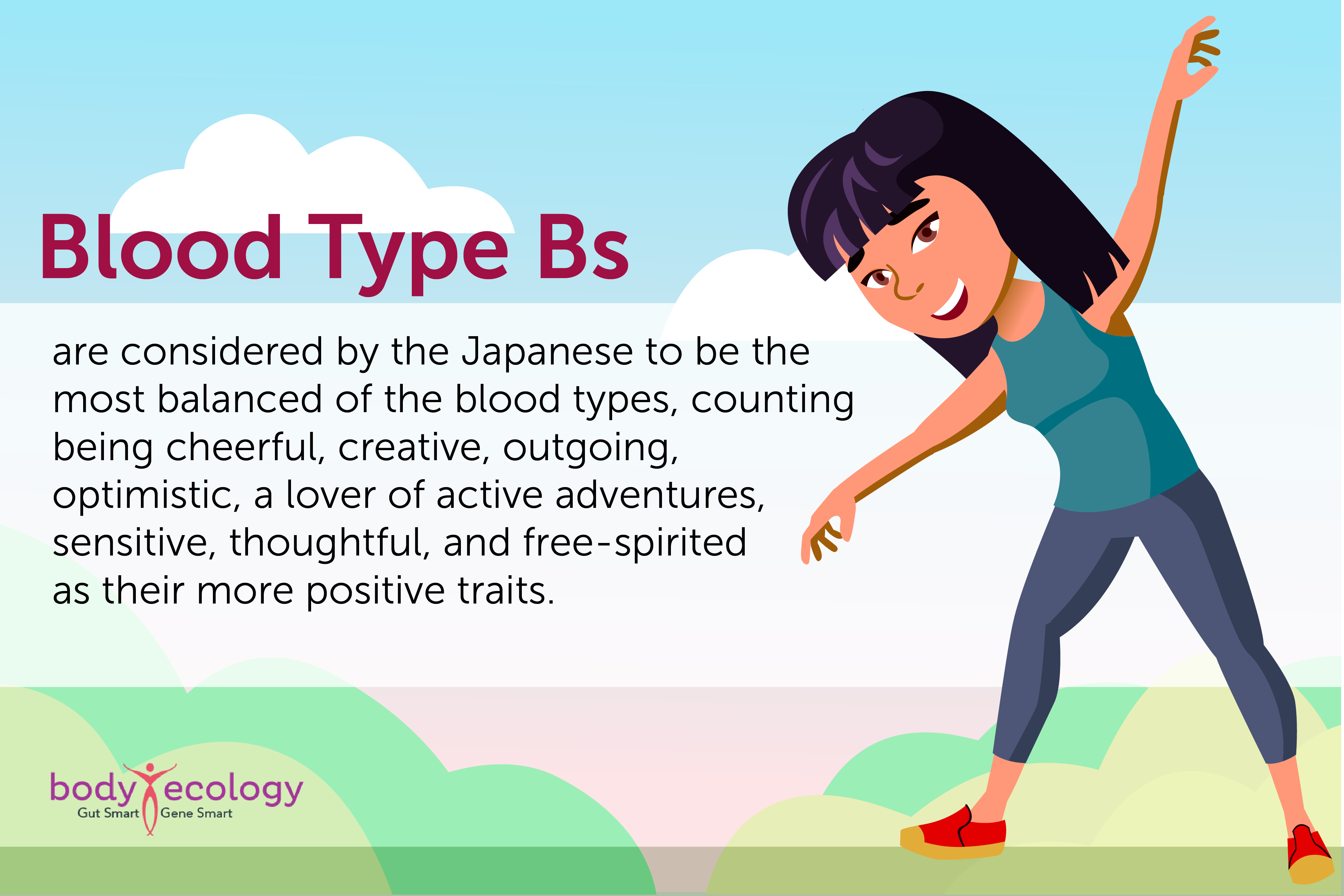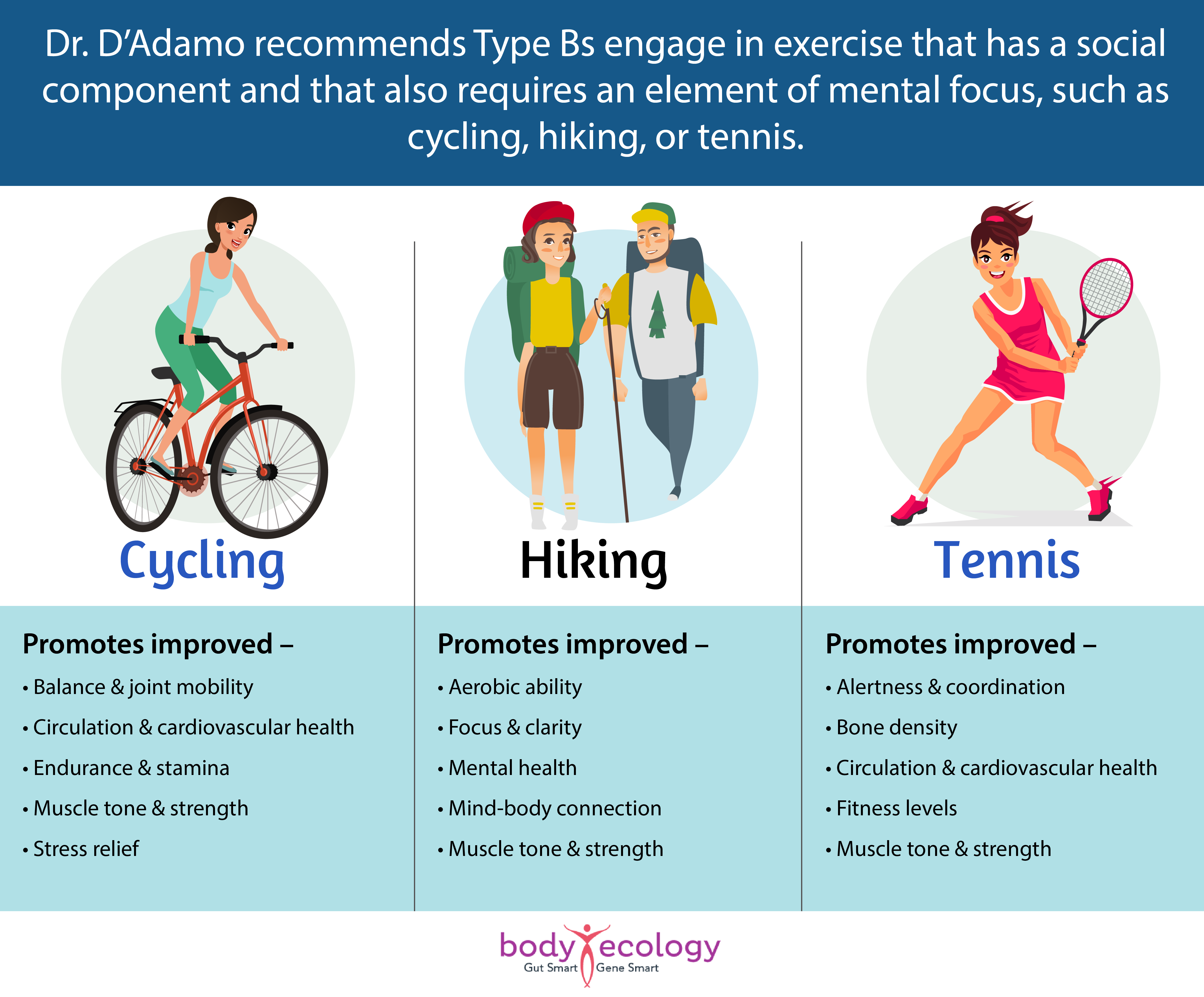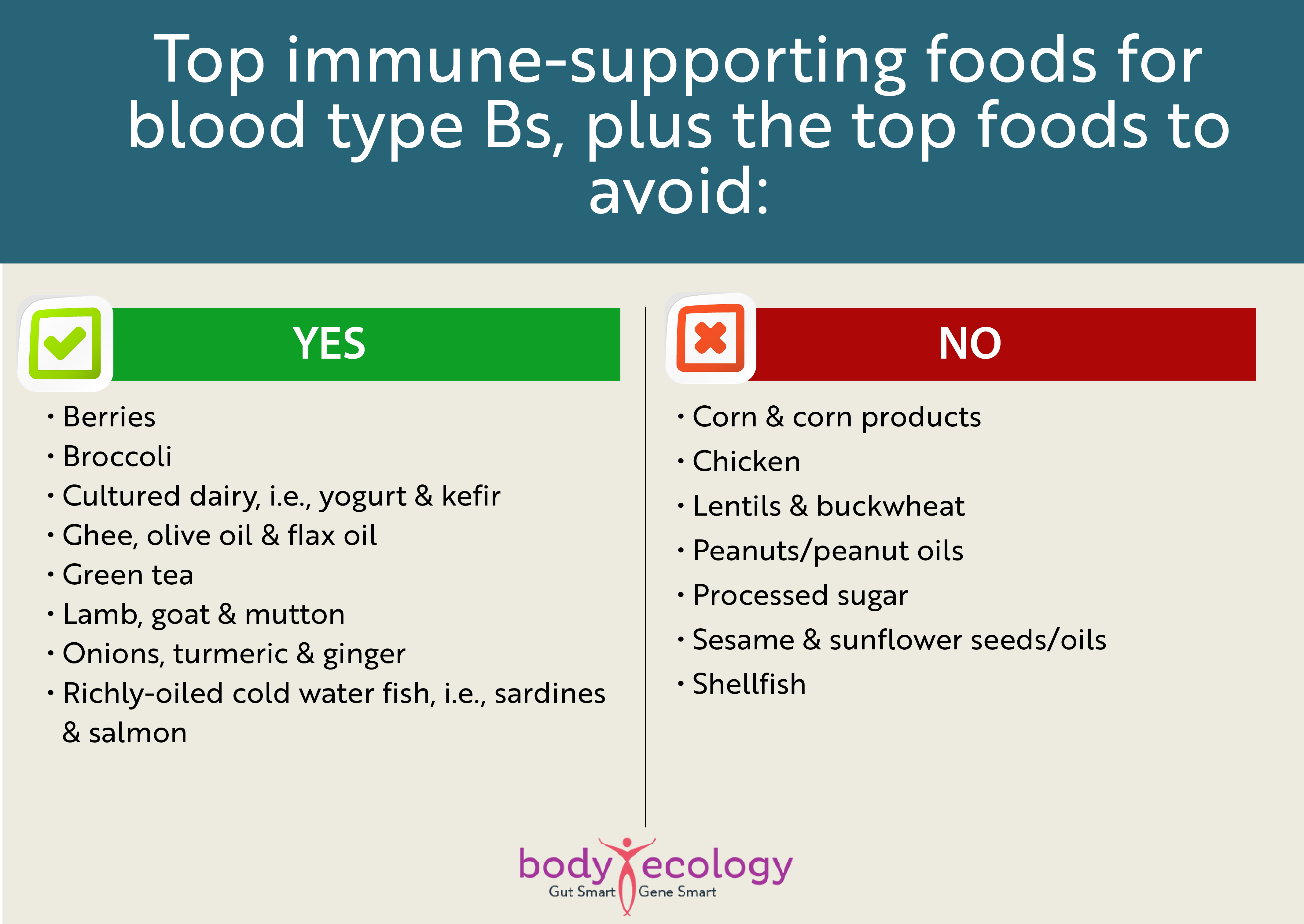
Body Ecology blood type series: Being (type) B
With this second article in our series on blood types and how one’s own biochemistry might reveal the basis for disease, healthy aging, fitness, and even emotional resilience, we return to the basis for this concept.1 It originated with Dr. Peter D’Adamo’s controversial book, Eat Right for Your Type: 4 Blood Types, 4 Diets, updated and revised in 2016.2
In the book, Dr. D’Adamo, a naturopathic physician, shares recommendations for health, wellness, and lifestyle practices that, when implemented, may positively impact different areas of health based on your specific blood type.
Included are guidelines for minimizing the risk of certain diseases; maximizing fitness goals by capitalizing on the genetic, physiological potential associated with your blood type; and implementing dietary changes that could help you feel your best and possibly even lower the risk of a number of diseases or conditions in the process.
You can read about blood type A in our first article in the series. This second article explores being blood type B.
Free download: Get the Body Ecology blood type ebook.
All about Bs: Diving into diet, exercise & personality
The ABO blood group system was discovered by (Austrian-born) American scientist Karl Landsteiner in 1900 when he set out to learn why some blood transfusions were successful and others killed the patient.3 He received the 1930 Nobel Prize for Physiology or Medicine for his identification of the major blood groups and the development of the ABO blood typing system.4
Based on the ABO blood group theory discovered by Landsteiner:
- We define blood types by the existence or absence of antigens.
- Antigens are molecules that can cause an immune response if the body sees them as foreign invaders.
- The response is typically for the body to attack such an invader, which will happen if the body receives blood from the wrong blood type.
- The four major blood types are classified by the existence or absence of either the A or B antigen on the surface of one’s red blood cells.
Furthermore, the Rh factor, a protein that can also be either present or not present on red blood cell surfaces, is identified by a “+” or a “-” following the blood type. This serves to further differentiate the blood types. So, if you have type B blood and are Rh-positive, your blood type would be B+.
The Rh blood group is highly complex. It was discovered in the 1960s and incorrectly named after the Rhesus monkey.5 It’s considered almost as important as the ABO blood group theory itself.
-
Blood type B personality.
According to Dr. D’Adamo, blood types “appear to have arrived at critical junctures in human development.”2 He further explains in his book that blood type O developed in our African hunter-gatherer ancestors, type A at the dawn of agriculture, and type B between 10,000 and 15,000 years ago in the Himalayan highlands.
As we discuss in our first article, the Japanese take blood types very seriously, believing that one’s personality, career, and dietary preferences trace back to one’s blood type. Ketsueki-gata is the name for what the Japanese label this culturally important classification, similar to astrology in the West.
Overall:
- The Japanese describe Type Bs as having strong personalities — and as being rather selfish, not a trait admired in the Japanese culture.
- But they also classify Bs as being curious types (though they purportedly lose interest easily, which perhaps could be attributed to their nomadic heritage).
- Bs prefer unusual activities and tend to be sincere, upfront, and somewhat rebellious.

-
Blood type B exercise.
Type Bs are rather unique when it comes to exercise and what constitutes a payoff for activity:
- Bs tend to have an abundance of energy and require a way to burn off excess cortisol.
- Typically, they don’t experience an “endorphin high” as some other blood groups might, but rather, they burn through some of the constant, steady-state energy that can be a cause of distraction to their brains as it can otherwise create stress and anxiety.
- Regular exercise, then, is very important for Type Bs and should be a balance of high-energy, more intense exercise and calming activity.

What does a day in the life of the Body Ecology program look like? Find out now.
-
Blood type B diet.
According to Dr. D’Adamo’s theory, those who follow a diet based on their blood type will digest food more efficiently, leading to weight loss, increased energy, and potential disease prevention (though there are no clinical studies to support this claim). Weight loss may be attributed to specific foods that are harmful to many people anyway, like processed foods and wheat.
D’Adamo describes type Bs as having a love of all food:
- That sounds fun — though he advises not to eat corn/wheat products or buckwheat (which is a grain-like seed) on a blood type B diet.
- He also discourages the consumption of lentils, tomatoes, peanuts, and sesame seeds. (All high in oxalates anyway.) They may contribute to fatigue, fluid retention, and hypoglycemia.
- Bs are cautioned to avoid chicken, but turkey is fine. They’re encouraged to eat wild game and other meats; chicken contains a lectin that may attack the B’s bloodstream and has the potential to lead to immune system problems.
- Organic eggs are a helpful source of protein on a blood type B diet.
- Bs are the type that do best on dairy — preferably low-fat.
- Green vegetables are a great choice on a blood type B diet; Bs thrive on broccoli, cabbage, turnip greens, kale, and collards.

Bs do really well on spirulina and sea veggies, like wakame. At Body Ecology, we suggest trying our Spirulina Plus Superfood. It’s high in plant-based protein and contains loads of vital nutrients. Spirulina also supplies a broad variety of amino acids, vitamins, minerals, and trace elements together with rare, unsaturated fats, including gamma-linolenic acid. It’s truly a super food.
Fact or fiction? Your blood type influences your risk of COVID-19
At one point during 2020, a claim arose asserting that certain blood types would not be susceptible to, or would be less susceptible to, the SARS-CoV-2 virus known as COVID-19. Those with blood type O, for example, rejoiced and celebrated their new “superhuman” status. But is it urban legend?
Studies were then conducted that looked at the validity of these claims (whose origins are unknown) as to whether an individual’s blood type predisposed them to certain outcomes, ranging from immunity to death, should they contract the virus. Those initial studies concluded that no link existed between ABO blood type and surviving COVID-19 or having a less severe reaction to the virus.
However, recent studies seem to indicate there might be more to the idea. A November 2020 study published in Nature Communications found that a link may exist between ABO blood type and those likely to contract severe cases of COVID-19.6
The study reviewed data collected from over 14,000 patients in the New York City area, confirmed their blood type, and measured the connection between ABO blood types (and Rh blood types) and the likelihood that the disease would progress from infection to intubation — to death in those patients.
They found that non-O blood types were slightly more susceptible than blood type Os to becoming infected. They discovered that, of those patients needing intubation, the rate among type As was decreased but increased among ABs and Bs as compared with type O. The risk of death was shown to increase for blood type AB but decrease for blood types A and B.
Patients with the Rh-negative factor associated with their blood type (i.e., blood type B-) were found to have a lower likelihood of infection, intubation, or death.
Researchers concluded, “Our results add to the growing body of evidence suggesting blood type may play a role in COVID-19.”
A June 2020 article published in The New England Journal of Medicine, looking at patients whose data were logged in Italy and Spain, found that the risk of COVID-19 infections among blood type A was higher with a lower risk among O blood types.7 Interestingly, they discovered lower risks of ventilation required for all non-O types, though this data was reportedly not statistically significant.
This is good news for type Os but mixed results for type Bs.
But bottom line, this blood type/COVID connection remains unclear. So, no matter what your blood type is, everyone needs to focus on their immune system.
Build a robust, hardy immune system with fermented foods in your blood type B diet: 3 to 4 ounces of InnergyBiotic or CocoBiotic — fermented liquids with a wonderful diversity of microbes — also helps build immunity. Make sure you prioritize sleep, do some light exercise — like walking or yoga — and perhaps, most importantly, keep your cortisol levels within a healthy range.
In the long run, balance is important for all blood types.
Free download: Get the Body Ecology blood type ebook.
REFERENCES:
- 1. Ewald DR, Sumner SC. Blood type biochemistry and human disease. Wiley Interdiscip Rev Syst Biol Med. 2016;8(6):517-535. doi:10.1002/wsbm.1355.
- 2. DAdamo, Peter, and Catherine Whitney. Eat Right 4 Your Type (Revised and Updated): The Individualized Blood Type Diet® Solution. New American Library, 2016.
- 3. Farhud DD, Zarif Yeganeh M. A brief history of human blood groups. Iran J Public Health. 2013;42(1):1-6.
- 4. MLA style: The Nobel Prize in Physiology or Medicine 1930. NobelPrize.org. Nobel Media AB 2021. Mon. 12 Apr 2021.
- 5. Dean L. Blood Groups and Red Cell Antigens [Internet]. Bethesda (MD): National Center for Biotechnology Information (US); 2005. Chapter 7, The Rh blood group.
- 6. Zietz, M., Zucker, J. & Tatonetti, N.P. Associations between blood type and COVID-19 infection, intubation, and death. Nat Commun 11, 5761 (2020). https://doi.org/10.1038/s41467-020-19623-x.
- 7. Ellinghaus D, Degenhardt F, Bujanda L, Buti M, Albillos A, Invernizzi P, Fernández J, Prati D, Baselli G, Asselta R et al (2020) Genomewide association study of severe Covid-19 with respiratory failure. N Engl J Med:NEJMoa2020283. https://doi.org/10.1056/NEJMoa2020283.










